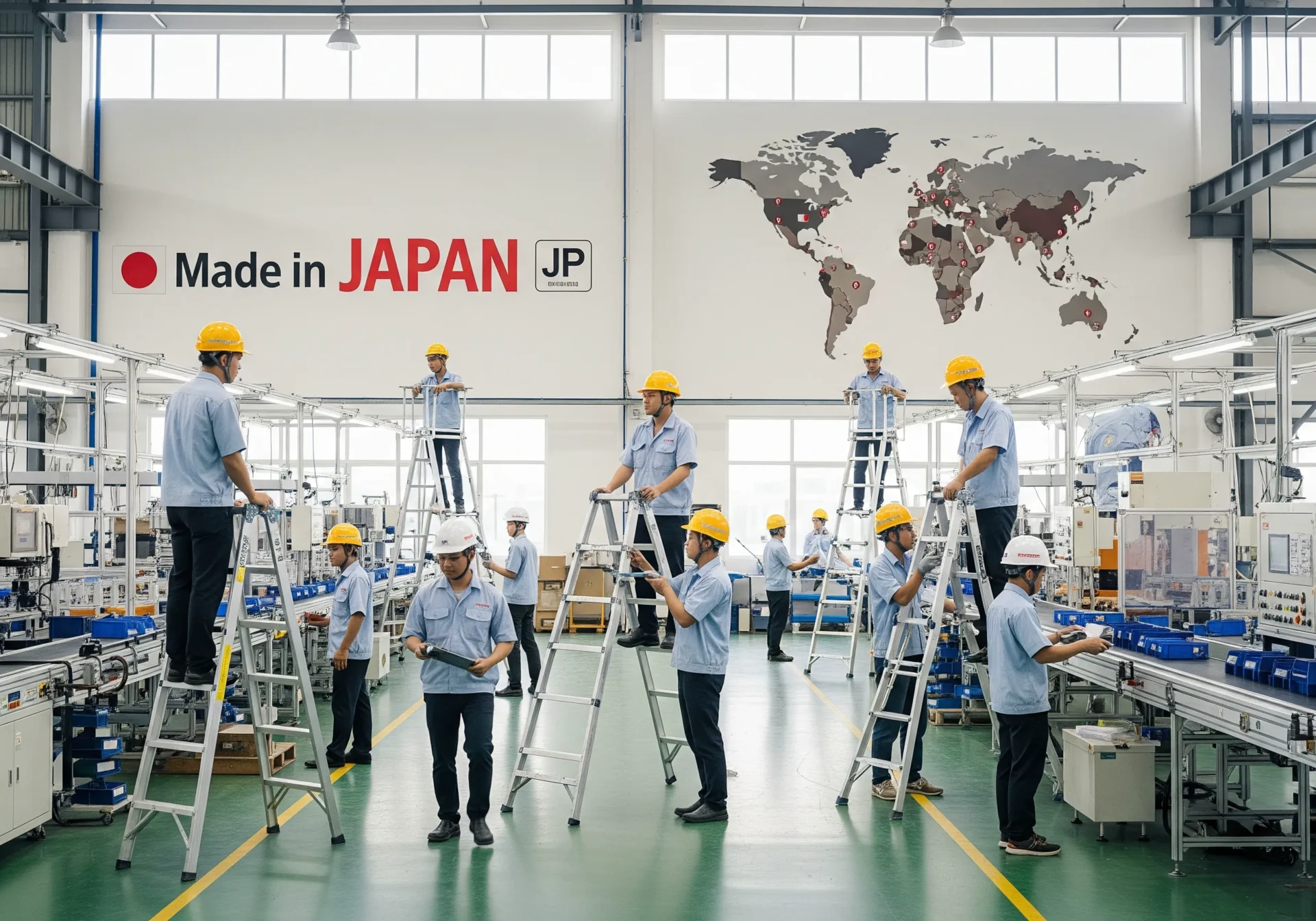Introduction
Since its founding in 1956, Hasegawa Kogyo has been a pioneer in the field of ladders, stepladders, and work platforms. The strict “Made in Japan” quality standards established in its home country are delivered worldwide not just as product value, but as a symbol of safety and reliability. Within this global expansion, Vietnam plays an indispensable role as a crucial foothold into the ASEAN market, serving key functions in manufacturing, exporting, and market development.
Hasegawa’s Journey of Global Expansion
Hasegawa Kogyo’s global expansion began with the strengthening of its domestic foundation. By building a nationwide network of two domestic factories, seven sales offices, and distribution centers, the company won the Excellence Award at the “Product Safety Award” by the Ministry of Economy, Trade and Industry in 2012. This established the brand value that “Hasegawa means safe products.”
In 2001, the company first expanded into China, establishing a local factory to enhance cost competitiveness. In 2010, it also began domestic sales in China, promoting a multi-location strategy in response to market changes.
Subsequently, due to shifts in the political and economic environment, the company established the Quang Nam factory in Vietnam in 2013 as its next manufacturing base after China. Taking advantage of low land costs and a regulatory environment similar to China’s, the factory manufactures products for export to Japan and the United States, and is growing as a base for developing the ASEAN market.
Currently, Hasegawa supplies products to over 17 countries, including the United States, and has expanded its sales channels through partnerships with top overseas manufacturers. It has steadily strengthened its business foundation and established its position as a global company.
New Market Strategy Expanding from Vietnam
The Vietnam base is not just a manufacturing hub; it is the starting point for new market development in the country and the broader ASEAN region. In 2024, the company exhibited for the first time at “Cleanfact RHVAC,” achieving over 200 business card exchanges, primarily for its cleanroom-related products. Sparked by inquiries from the precision equipment and medical fields, the company is now considering horizontal expansion into other sectors such as airport aircraft maintenance and food processing.
Strengthening the local supply chain is also underway. The procurement of aluminum materials, which previously depended on China, has been switched to collaboration with domestic Vietnamese suppliers, reducing procurement risks and shortening delivery times.
As a next step, the company plans to exhibit at “VIMF 2025” in the industrial zone of Binh Duong in June 2025. At this exhibition, which targets the manufacturing industry as a whole, Hasegawa aims to expand its sales channels beyond its existing customer base and cultivate new markets.
Mechanisms to Protect Global Quality
Hasegawa thoroughly transfers the quality management philosophy and methods cultivated in Japan to its overseas bases. Regular training is conducted at overseas factories to share the quality standards set for each manufacturing process. This has established a system that enables stable production of products at the same level as the Japan headquarters in both Vietnam and China. Furthermore, the company complies with international standards such as ISO 9001 and the safety standards of various countries, ensuring its reliability in the international market.
The company also emphasizes the localization and collaboration of each base. In Vietnam, local staff take the lead in managing exhibitions, conducting business negotiations and assisting visitors in multiple languages. The fusion of locally-led activities and the head office’s quality philosophy allows the company to continue providing consistent brand value worldwide.
The Future Hasegawa Envisions
Hasegawa aims to become the world’s number one ladder and stepladder manufacturer in terms of quality, sales volume, and brand reliability. To achieve this, the company is promoting a plan to steadily implement improvements and innovations, one step at a time, from product design to after-sales support.
The company also values a corporate culture that grows with its employees. It actively incorporates the energy and new ideas of young employees into product planning and provides opportunities for developing globally competent human resources and diverse career paths. Through these initiatives, the company moves forward with the growth of each employee and the evolution of the company as two wheels of the same cart.
Conclusion
Hasegawa’s global expansion is supported by three pillars: a quality foundation cultivated in Japan, a flexible strategy that responds to local needs, and human resource development. The Vietnam base is not only a cornerstone of manufacturing and exports but also an entity that creates a ripple effect throughout the entire ASEAN market. The company will continue to balance the challenge of entering new markets with maintaining quality, striving to become the world’s number one ladder and stepladder manufacturer.
Related Link: https://hasegawa.com.vn/

